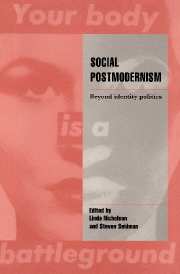Book contents
- Frontmatter
- Contents
- Notes on contributors
- Acknowledgements
- Introduction
- Part I Critiques of identity
- Part II Critiques of the deconstruction of identity
- Part III Postmodern approaches to the social
- Part IV Postmodern approaches to the political
- 11 Feminism, citizenship, and radical democratic politics
- 12 The space of justice: lesbians and democratic politics
- 13 Against the liberal state: ACT-UP and the emergence of postmodern politics
11 - Feminism, citizenship, and radical democratic politics
Published online by Cambridge University Press: 29 October 2009
- Frontmatter
- Contents
- Notes on contributors
- Acknowledgements
- Introduction
- Part I Critiques of identity
- Part II Critiques of the deconstruction of identity
- Part III Postmodern approaches to the social
- Part IV Postmodern approaches to the political
- 11 Feminism, citizenship, and radical democratic politics
- 12 The space of justice: lesbians and democratic politics
- 13 Against the liberal state: ACT-UP and the emergence of postmodern politics
Summary
Two topics have recently been the subject of much discussion among Anglo-American feminists: postmodernism and essentialism. Obviously they are related since the so-called “postmoderns” are also presented as the main critics of essentialism, but it is better to distinguish them since some feminists who are sympathetic to postmodernism have lately come to the defense of essentialism. I consider that, in order to clarify the issues that are at stake in that debate, it is necessary to recognize that there is not such a thing as “postmodernism” understood as a coherent theoretical approach and that the frequent assimilation between poststructuralism and postmodernism can only lead to confusion. Which is not to say that we have not been witnessing through the twentieth century a progressive questioning of the dominant form of rationality and of the premises of the modes of thought characteristic of the Enlightenment. But this critique of universalism, humanism, and rationalism has come from many different quarters and it is far from being limited to the authors called “poststructuralists” or “postmodernists.” From that point of view, all the innovative currents of this century – Heidegger and the post-Heideggerian philosophical hermeneutics of Gadamer, the later Wittgenstein and the philosophy of language inspired by his work, psychoanalysis and the reading of Freud proposed by Lacan, American pragmatism – all have from diverse standpoints criticized the idea of a universal human nature, of a universal canon of rationality through which human nature could be known as well as the traditional conception of truth.
- Type
- Chapter
- Information
- Social PostmodernismBeyond Identity Politics, pp. 315 - 331Publisher: Cambridge University PressPrint publication year: 1995
- 46
- Cited by

